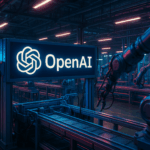OpenAI has embarked on a significant venture by establishing one of the world’s largest GPU facilities, situated in Northern Norway, marking its first European data center. The initiative, named Stargate Norway, is a collaborative project with Nscale Global Holdings and Aker ASA, representing a $1 billion investment focused on leveraging renewable energy sources. The facility, located in the cold climate of Kvandal, is a strategic choice aimed at optimizing energy efficiency to support a sustainable AI infrastructure.
Similar initiatives in the past have also harnessed the advantages of renewable resources paired with cutting-edge technology to drive AI advancements, like those seen in data centers utilizing renewable energy in Iceland and Sweden. However, Stargate Norway sets itself apart through its scale, combining vast compute capacity with substantial sustainability measures, incorporating the potential dual benefits of technological progression with environmental considerations.
What Makes Stargate Norway Different?
Stargate Norway stands out by promising a scalable power capacity of up to 520 megawatts, initially deploying 100,000 NVIDIA GPUs by 2026, thus underscoring its significant computational capabilities. It’s powered by renewable hydropower and employs closed-loop liquid cooling systems, enhancing its energy efficiency and minimizing its environmental footprint. This aligns with Norway’s dedication to sustainable industry practices, which was a pivotal factor in choosing this location.
How Does It Support Local and Regional Innovation?
The initiative aims to boost local and regional innovation by being part of OpenAI’s “OpenAI for Countries” program. This effort is designed to provide countries with locally governed computing resources that align with national AI strategies. Norwegian public institutions and researchers, along with emerging AI companies, will have prioritized access to the compute capabilities, while spare capacity will be made available to partners across the Nordics, the UK, and Northern Europe.
Brad Lightcap, OpenAI COO, emphasized the facility’s importance for scalable AI infrastructure in Europe, stating,
“Stargate Norway represents a critical step forward in building scalable, sustainable AI infrastructure in Europe.”
Moreover, Øyvind Eriksen, President and CEO of Aker ASA, also sees broader implications, mentioning,
“This isn’t just a data centre; it’s a digital-industrial platform.”
The production of waste heat from the facility will be repurposed for district heating and low-carbon industrial use within Narvik and neighboring communities. This approach ensures that the environmental impact is mitigated while serving diverse computational needs in AI training, inference, and large scientific simulations.
OpenAI will initially utilize the compute capabilities, with expansion plans open to both public and private sectors. Nscale and Aker have committed to funding the project’s initial phase, with future investment anticipated as the capacity grows to meet expected demands.
The development of Stargate Norway signifies a critical juncture in AI computing, merging extensive compute capabilities with environmental mindfulness. This project not only aims to further scientific and academic endeavors but also to support local innovation, paving a path toward responsible technological growth. The unique geographical and environmental factors of Norway additionally provide a framework for similar future developments around the world.










